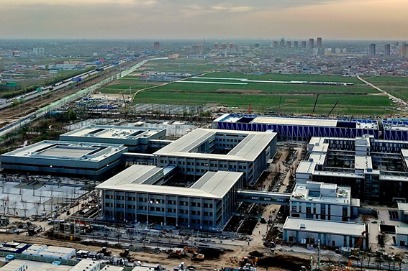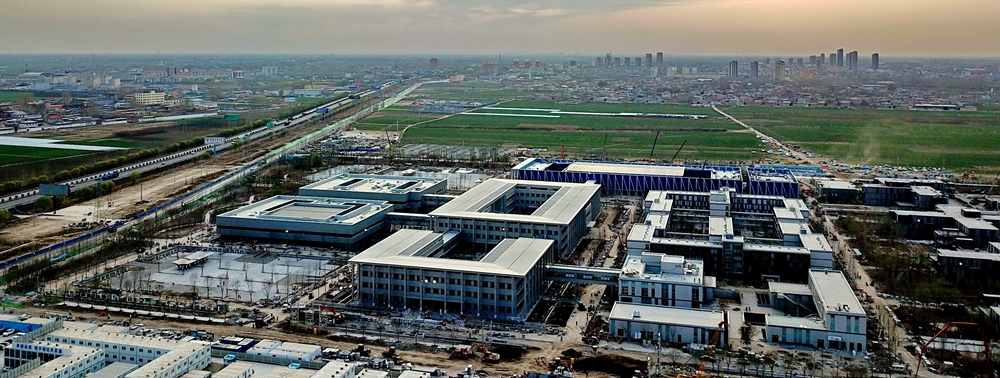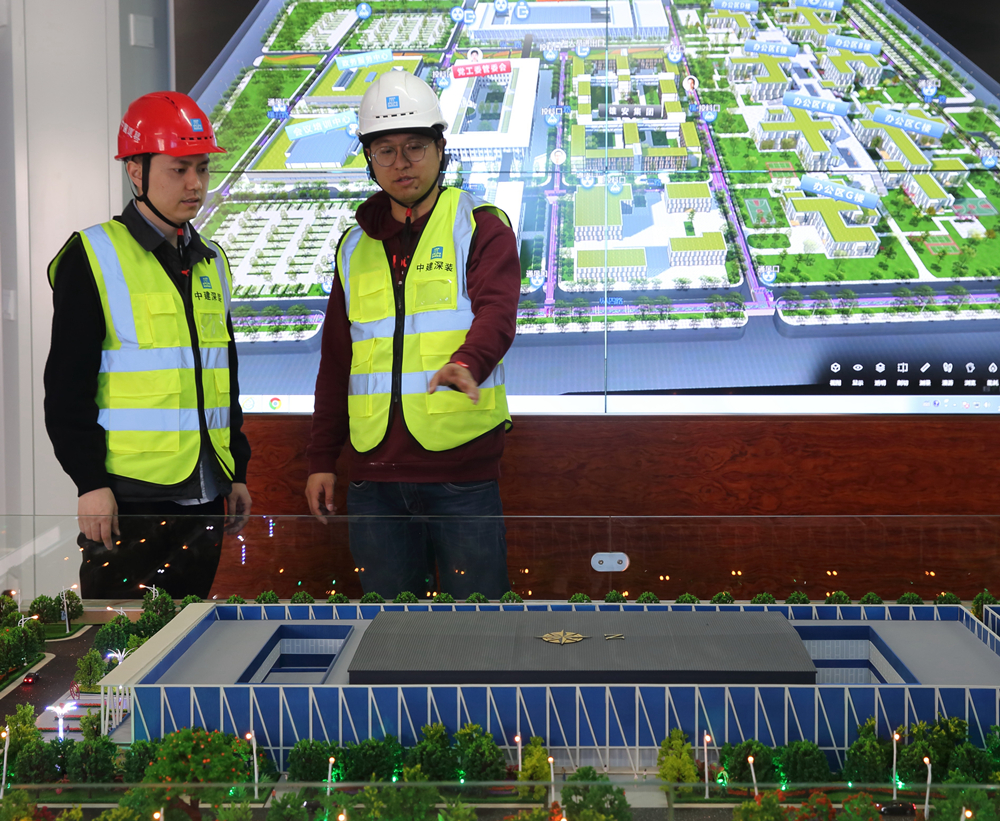



In plan introduced by Xi, Xiongan incubator is open and Citizen Service Center is nearly finished
With great attention paid by President Xi Jinping, the creation of Xiongan New Area is making steady progress since the surprising announcement of the millennium project a year ago.
Since the project was unveiled on April 1, 2017, the new economic zone, which is expected to help spare Beijing of functions unrelated to its status as national capital, has caught the spotlight worldwide with its fast and efficient construction.
The Xiongan New Area, about 100 kilometers southwest of Beijing, also is part of measures to advance the coordinated development of the Beijing-Tianjin-Hebei region. It is the third new area of national significance after the Shenzhen Special Economic Zone and the Shanghai Pudong New Area.
During his visit to Anxin county in February 2017, Xi, also general secretary of the Communist Party of China Central Committee, called for "world vision, international standards, Chinese characteristics and high goals" in the planning and construction of Xiongan New Area.
The move is a "major historic and strategic choice made by the CPC Central Committee with Comrade Xi Jinping as the core," said a circular released a year ago by the CPC Central Committee, which described the decision as "a strategy crucial for a millennium to come."
The leader's attention
In his report delivered at the CPC's 19th National Congress in October, Xi emphasized the importance of relieving Beijing of functions nonessential to its role as the capital and using this effort to drive the coordinated development of the Beijing-Tianjin-Hebei region.
"We will develop forward-looking plans and adopt high standards for building the Xiongan New Area," Xi said in his report.
On Feb 22, Xi presided over a meeting attended by members of the Standing Committee of the Political Bureau of the CPC Central Committee, during which the senior leaders said efforts should be made to build Xiongan New Area into a "high-quality, modern socialist city".
The leaders, after hearing a report about the progress on a development plan for Xiongan, agreed that building the new area is a "historic project".
The surprising announcement of setting up the new area a year ago represented the results of years of research and rumination by the CPC Central Committee and is a major strategic decision that will open a new era of development in the region.
Addressing a central economic meeting at the end of 2014, Xi said that transferring Beijing's non-capital functions, reducing its population density and promoting economic and social development commensurate with its population and resources must be at the core of a coordinated development of the Beijing-Tianjin-Hebei region.
During CPC meetings in April 2015, Xi suggested investigating the possibility of a new city in Hebei, built according to new development concepts.
On March 24, 2016, Xi heard a report on the creation of Beijing's "subsidiary center" and another area to which noncapital functions would be shifted from Beijing. The subsidiary center is to be located in the eastern suburb of Tongzhou, while the other area will be Xiongan.
Xi said Beijing is at a historic juncture. Tongzhou and Xiongan will form two "wings" for Beijing and create new growth engines for Beijing-Tianjin-Hebei.
On May 27, 2016, Xiongan New Area appeared for the first time in a report reviewed at a CPC Central Committee Political Bureau meeting.
Calling it a "major historic and strategic decision" that would be "crucial for the millennium to come," Xi said the subsidiary center of Beijing and Xiongan New Area should withstand the test of history and be the legacy of the future generation.
According to the president's plans, Xiongan New Area will primarily receive noncapital functions from Beijing, including some administrative and public institutions, company headquarters, financial institutions, higher education institutions and sci-tech units.
The zone will span Xiongxian, Rongcheng and Anxin counties in Hebei province, covering 2,000 square kilometers in the long term with a population of 2 million to 2.5 million.

Progressing steadily
On Feb 28, construction began on a railway linking Beijing and Xiongan New Area. The 92.783-kilometer line, with a total investment of 33.38 billion yuan ($5.22 billion), is scheduled to be completed in February 2020.
The huge potential of Xiongan has prompted numerous enterprises, including top technology companies such as Alibaba, Baidu and Tencent, to set up branches there. Many State-owned enterprises also have unveiled plans to take part in the project.
Jack Ma, founder of Alibaba Group, said during the signing ceremony of a cooperation deal between Alibaba and Xiongan New Area on Nov 11 that his company would like to offer its most advanced technology and innovate resources to build Xiongan into an example of China's future city.
Lin Jianhua, president of Peking University, said on March 13 that the university has started cooperation with Xiongan New Area and planned to build a top-class medical studies center to provide scientific research, staff training and medical service for the new area.
Supporting construction of Xiongan New Area is an unshakable responsibility for Peking University, he said.
On March 25, the first innovation and start-up center opened. It is designed to support projects related to new energy, information engineering, new materials and environmental protection.
Eleven companies have signed up with the center, focusing on developing artificial intelligence, internet security, virtual reality, retailing and online education.
According to a report published March 26 in People's Daily, construction of the main structure of the Citizen Service Center already has been completed after months of rapid work. Late last year, China State Construction Engineering Corp won bidding for the 100,000-square-meter Citizen Service Center — now known as the first bid of Xiongan New Area.
He Lifeng, minister of the National Development and Reform Commission, said at a news conference on the sidelines of the top legislature's session last month that development of Xiongan New Area is making steady progress.
An administration has been set up and talent is being recruited from around the country, he said, adding that some existing needs, such as remediation of water, gas and electrical facilities and the restoration of freshwater Baiyangdian Lake, will be addressed gradually.
Tan Xuxiang, director of Beijing Municipal Development and Reform Commission, said the Beijing municipal government has dispatched 23 officials to work in Xiongan and support the construction of the new area.
Beijing will speed up the building of a kindergarten, a primary school, a high school and a hospital in Xiongan to provide excellent education and health service for the new area, he told reporters in March.
Yang Xiyu, a student of Hebei University of Architecture, whose home is in Xiongan, said that since Xiongan was set up, his hometown has become busy as numerous companies invade the area.
"I'm going to graduate soon and I hope that my hometown could become stronger so that I could find a good job there," he said.
Zhang Yiteng, a worker at a hotel in Xiongan, said that he was excited to see the rapid development of the new area during the past year.
"It is going to turn from a small city into a metropolis, with better infrastructure, education, transport and other aspects of life," he said.
Zhu Yue and Xinhua contributed to this story.
If you have any problems with this article, please contact us at app@chinadaily.com.cn and we'll immediately get back to you.